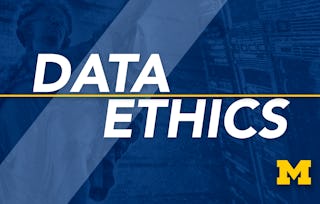Develop the ethical mindset every data scientist needs. In this course, you’ll examine the real-world implications of how data are collected, analyzed, and presented and the role of ethics in ensuring fairness, transparency, and trust.

Data Science Ethics with R

Data Science Ethics with R
This course is part of Data Science with R Specialization


Instructors: Mine Çetinkaya-Rundel
Included with
What you'll learn
Critically assess ethical concerns considering data intent and data privacy
Identify strategies that can be incorporated to help secure sensitive data
Define algorithmic bias and become conscious of when these situations may occur
Skills you'll gain
Details to know

Add to your LinkedIn profile
1 assignment
See how employees at top companies are mastering in-demand skills

Build your subject-matter expertise
- Learn new concepts from industry experts
- Gain a foundational understanding of a subject or tool
- Develop job-relevant skills with hands-on projects
- Earn a shareable career certificate

There is 1 module in this course
Data ethics is an essential component for those who work with data. In this module, we will become aware and hold discussions around how data visualizations can mislead and strategies to mitigate these types of situations. Further, we will discuss and critically think about data privacy. Lastly, we will define algorithmic bias and be aware of situations where this type of bias can occur.
What's included
5 videos17 readings1 assignment2 discussion prompts1 plugin
Earn a career certificate
Add this credential to your LinkedIn profile, resume, or CV. Share it on social media and in your performance review.
Offered by
Explore more from Data Analysis
 Status: Preview
Status: PreviewUniversity of Leeds
 Status: Preview
Status: PreviewUniversity of Michigan
 Status: Free Trial
Status: Free TrialGoogle
 Status: Free Trial
Status: Free TrialThe University of Notre Dame
Why people choose Coursera for their career

Felipe M.

Jennifer J.

Larry W.

Chaitanya A.

Open new doors with Coursera Plus
Unlimited access to 10,000+ world-class courses, hands-on projects, and job-ready certificate programs - all included in your subscription
Advance your career with an online degree
Earn a degree from world-class universities - 100% online
Join over 3,400 global companies that choose Coursera for Business
Upskill your employees to excel in the digital economy
Frequently asked questions
To access the course materials, assignments and to earn a Certificate, you will need to purchase the Certificate experience when you enroll in a course. You can try a Free Trial instead, or apply for Financial Aid. The course may offer 'Full Course, No Certificate' instead. This option lets you see all course materials, submit required assessments, and get a final grade. This also means that you will not be able to purchase a Certificate experience.
When you enroll in the course, you get access to all of the courses in the Specialization, and you earn a certificate when you complete the work. Your electronic Certificate will be added to your Accomplishments page - from there, you can print your Certificate or add it to your LinkedIn profile.
Yes. In select learning programs, you can apply for financial aid or a scholarship if you can’t afford the enrollment fee. If fin aid or scholarship is available for your learning program selection, you’ll find a link to apply on the description page.
More questions
Financial aid available,

